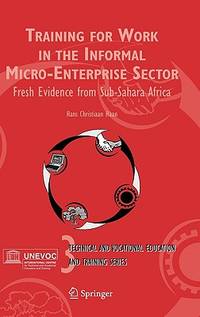
Training for Work in the Informal Micro-enterprise Sector: Fresh Evidence from Sub-sahara Africa [Hardcover Hardcover - 2006
by Haan, Hans Christiaan
- Used
- Hardcover
Description
Standard delivery: 14 to 30 days
Details
- Title Training for Work in the Informal Micro-enterprise Sector: Fresh Evidence from Sub-sahara Africa [Hardcover
- Author Haan, Hans Christiaan
- Binding Hardcover
- Edition First Edition
- Pages 280
- Volumes 1
- Language ENG
- Publisher Springer, Secaucus, New Jersey, U.S.A
- Date 2006-08-31
- Illustrated Yes
- Features Bibliography, Glossary, Illustrated, Table of Contents
- Bookseller's Inventory # AZ-UPLOAD14-A12369
- ISBN 9781402038273 / 1402038275
- Weight 1.4 lbs (0.64 kg)
- Dimensions 9.52 x 6.62 x 0.83 in (24.18 x 16.81 x 2.11 cm)
- Library of Congress subjects Small business - Africa, Sub-Saharan, Occupational training - Africa, Sub-Saharan
- Library of Congress Catalog Number 2007464559
- Dewey Decimal Code 331.252
About Cheap Geographical Essays Swansea, United Kingdom
We specialise in Academic texts but will hopefully expand into the wider book market soon
From the rear cover
In Sub-Sahara Africa, the sector of informal micro-enterprises (IMEs) is already employing a large share of the labour force in both urban and rural areas. There are even indications that in the past decade it has been a source of employment and incomes for nine out of every 10 new entrants to the labour market. This study reviews the ways in which the owners and workers of IMEs have acquired the vocational and management skills that they are using in the operation of these ventures. It reviews the contributions of all the different training providers, including public sector training institutes, private sector training providers, and training centres run by NGOs and other non-profit organizations. Its findings confirm the notion that the training efforts of these formal training providers are only to a limited extent relevant for the IME operators, and that many of the poor and other vulnerable groups do not have ready access to these programmes. The study finds that informal apprenticeship training is by far the most common source of various skills - in some countries it is likely to be responsible for 80-90% of all ongoing training efforts. Informal apprenticeship training presents a number of important advantages: it is practical, hands-on training at an appropriate level of technology, takes place in the real world of work, offers good prospects for post-training employment and is essentially self-financing. At the same time it has a number of limitations: the training quality is often modest, there is a risk of 'incomplete' transfer of skills and knowledge, limited infusion of technological progress, and uncertainties with regard to the duration of the apprenticeship period, the training programme and the skills acquired at the end of the training. The study concludes that there is a major challenge to improve the transfer of relevant skills to IME operators, through both pre-employment training and skills upgrading. In view of the scope of thechallenge to provide hundreds of thousands IME owners and workers, as well as large numbers of out of school youths, with relevant practical and management skills, it suggests to build upon the strengths of the existing practices of informal apprenticeship training and to remedy its weaknesses by involving professional training providers in upgrading its training organization and delivery, quality and efficiency, and final training outcomes. It reviews the results of a number of innovative interventions in different African countries that are working in this direction. Finally, the study suggests that there is an interesting potential in'business-embedded training' provided by private companies as part of their regular business operations.
